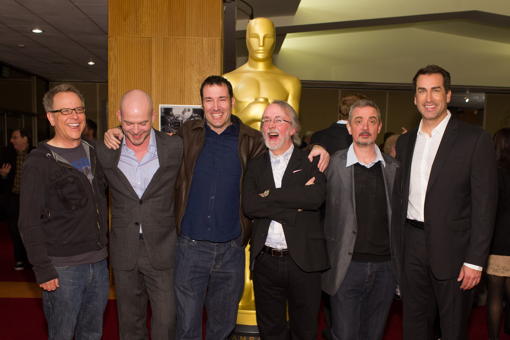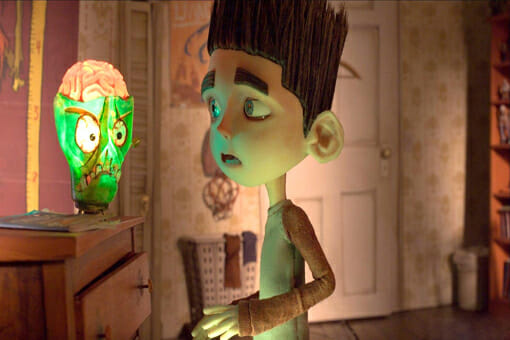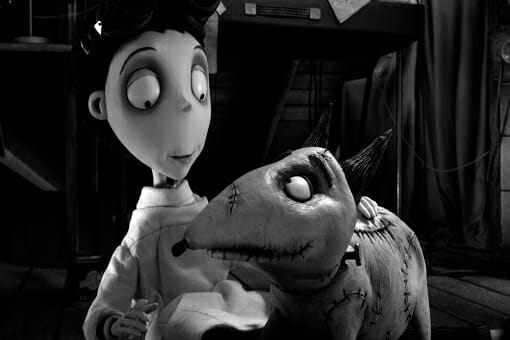Sign up for the
TSL Newsletter
and get $50 off Final Draft 12
By Meredith Alloway · February 22, 2013

The night felt more like experiencing a stand-up comedy club than an Academy Award Q&A. It was wonderfully refreshing and unexpected. Rob Riggle, best known for his work in 21 Jump Street, The Lorax and Hotel Transylvania, hosted the evening honoring the Animated Feature nominees. The filmmakers offered insight on their process and visions, each doused with their own unique sense of humor.

Faces masked in 3D glasses, we first watched a clip from Disney and Pixar’s Brave directed by Mark Andrews and Brenda Chapman. Brenda was the only female nominee, and sadly wasn’t in attendance due to illness. Andrews took the stage with Riggle and was asked, “Brave is first film from Pixar with a female protagonist. Did this have an affect on you?” Andrews replied, "No and it shouldn't.”
Pixar has been known to have its main characters be a toy, animal and a female leadshould require no different development. “We grow the characters from the ground up." He discusses that their priority was to have Merida be independent and strong.
During the time period of Brave, princesses really would have had to fight for a voice. She was, "Inspired by Brenda's own relationship with her daughter,” Andrews tells us of his co-director’s 6 year old. The little girl is already forming her own opinions and he describes that Chapman worried, “Holy shit, what's she gunna be like as a teenager?" That spawned the exploration that is the core of Brave: a mother and daughter relationship.
The film is also based on Andrew’s own family experiences. He laughs saying his daughter often complains, "My brothers get away with murder, and I don't get away with anything!" It’s a line you’ll notice in the movie. But Andrews most importantly wanted to make the film entertaining. “We go see movies, so we can be young Scottish lasses…so we can be warlords…we go to escape."

Secondly, we viewed the opening sequence of Paranorman about a young boy who is friends with the dead. Butler explained that his Nanna introduced him “to the concept of death.” He laughs, “Sounds morbid to think about.” It’s a theme prevalent in the film where Paranorman’s grandmother also watches over him after she’s gone.
Riggle jokes that many of us fear that "A lot of our dead relatives are watching us masturbate.” Fell and Butler stare at him and he recovers, “Just me?" We all can’t help but chuckle as Butler responds, "We're talking about my grandmother!"
The directors go on to discuss that they spent a year together before diving into production. They wanted the film to be, "John carpenter meets John Hughes", and the 80s references are definitely recognizable. Fell describes that because they were both on the same page about the story, they had the opportunity to “discuss the aesthetic.” Some of their influences were, “Goonies…ET…Night of the Living Dead”, which Butler tells us he watched when he was only 8 years old. He thought, “It's black and white. How bad can it be!?”
But Riggle and Fell agree that as kids, you want to be scared, to go to those unknown places your parents don’t want you to go. Taking influence from zombie movies also brought up the idea of having their own social commentary for Paranorman, which ended up being “bullying.”

The Pirates! Band of Misfits clip previewed next, prompting many laughs with its quirky, British humor. Director Peter Lord, best known for his Oscar winning feature Wallace & Gromit in the Curse of the Were-Rabbit sat down with Riggle who asked, “Why did you return to directing?”
Lord’s return is 12 years after his last film Chicken Run.
He replies, “If you're not watching carefully, it just happens to you…if I didn't put my hand up quick, I was just going to become a producer forever more." He quips that no one wants that, a joke that tickles the audience. The film is based on a book series by Gideon Defoe, who also wrote the screenplay.
Lord says he thought adapting books to screen, “Was a lazy thing to do.” But after reading the series, originally called The Pirates: An Adventure with Scientists”, he thought it was the funniest thing he’d ever experienced.
Regarding the casting of Hugh Grant as the captain, Lord admits, "I wanted a star, that helps with the movie. Hugh Grant always has to be dragged out of retirement… but he was turkey sold on the script. His shtick is his fabulous close up comedy. I wanted him to be big and show off.” Lord admits that it was all a learning process. By the end, Grant grew immensely. Riggle, who’s done his fair share of voiceover work, agrees, "It's a discovery isn't it?"
Lord offers insight on the strange challenges of working on animated films. “You never get the actors together…it’s stupid.” The cast is then forced to purely imagine the scenes and "it's a hard way to work.” Lord stresses, “It's hard to get that simple human warmth going.”
Riggle asks Lord why he chose to make Pirates stop motion. "I've done it since I was in high school. We've built around us a team of people who are brilliant at it,” Lord responds. "In our world we’re working with paint and iron and cameras and the most amazing toys in the world." He then goes on to poke fun at the other production companies who spend their days twiddling on their computers.

Rich Moore then took the stage after clips from Disney’s Wreck it Ralph screened. The film centers on a video game villain who no longer wants to be the “bad guy.”
Riggle asks what games inspired Ralph. Moore replies, “You'd be amazed that at an animation studio a lot of people like video games." He says they drew from many different games, even admittedly “Donkey Kong.”
The team was always ready to try different options, “It's a very organic process.” Riggle brings up the troubled production processes that Disney has faced recently and asks if Ralph moved smoothly. Moore says, "There had been for many years the desire to make a film about video games." When he came to the studio and saw it on the shelf, he thought it seemed like a "rich world" and then started over again with the idea of the life of video game characters.
Initially, Moore’s team didn’t know which characters they would use or how they would use them. They couldn’t go to companies early on for rights. He told his co-collaborators, “Lets pretend like we have full rights to anything we want.” This allowed them to flesh out an authentic, intricate story.
Moore was adamant about making relationships with the companies they would eventually go to rather than having Disney and Nintendo "fight to the death.” The director has worked in TV as well, directing over a dozen episodes of The Simpsons and Futurama.
Riddle asks how the two worlds differ. "From the first day you're behind" in Television. It’s always a "sprint and mad dash.” Moore continues to say he enjoys the process of features because they require more depth and growth for the characters; they are, “Pieces that stand the test of time.”
Riddle asks if Moore ever feels he’s happy with his pieces, and he begins by replying with a quote, which he soon forgets. Moore shouts to Andrews in the audience to help him out. Rising from the massive crowd, we hear him shout back, "We don't finish films, we release them!”

The next honoree perhaps needs no introduction. Riggle lists a few of his accomplishments that seem only a grain of salt in comparison to his immense body of work. Tim Burton’s Frankenweenie, a black and white exploration of a young boy who brings his dog back to life, is his latest nomination.
The feature was first a short that Burton created nearly three decades ago. He describes, “We went back to the drawings after many years. We got to explore Burbank again without actually going there." It’s clear Burton, who grew up in Burbank, has a love/hate/fascination with the specific area of Los Angeles. He says it was, "Fun to go back and remember kids I went to school with…scary teachers. When we built the classroom [model], and I saw it for the fort time, I got a really ill feeling.”
That’s when Burton knew they had gotten it right. Riggle asks how Burton decided on the film’s distinctive style. “You see the textures better…black and white and 3D" Burton describes, “It was exciting to me…it felt special.” Riggle asks if Burton got resistance from people on this decision. Burton shrugs, “I’m used to it.”
Eventually, his collaborators understood that the choice of black and white aided the emotion Burton wanted to unearth. With a straight face, Riggle brings up the fact that this is Burton’s first film without Johnny Depp in a long time. “Did you ever consider Johnny?” Burton mulls over the question, “"He does good barking sounds, but no.”